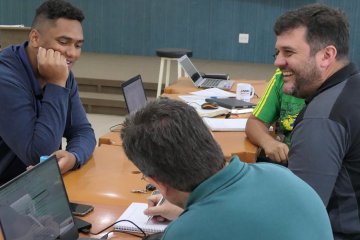Integrity Has a Price
 Jeff Atherstone
Jeff AtherstoneIt's no secret that corruption is a major problem in Uganda; on the world Corruption Perception Index we ranked #127 in 2010, which isn't as bad as Somalia at #178 but it still isn't anything to brag about.
What might be surprising to some who haven't experienced this type of corruption is that it is everywhere—the police, courts, government, church and business to name a few.
And today it is staring me in the face with a price tag beyond anything I have ever experienced.
Yesterday I was asked to pay a judge $1,000, which might not be much to some, but if I don't pay it, ARCC (Africa Renewal Christian College) could also lose another $100,000 (and yes, I am referring to US dollars)!
First the good news! We found the owner of the troublesome land that I wrote about last June and agreed on a price for the land and drafted a purchase agreement with our board and lawyers in November, received all the funds and made the payment for the land in December. This last week the seller (after much prompting) filed a court case to stop the squatters from all construction, farming or any other developments. This is a great step. Next, the squatters will face off with the seller in court. The seller (a lawyer) has all the proof required to show that they settled on the land illegally. The final step will be that the court will remove the squatters.
Here is the problem: even though the seller has the proof he needs to win in court, the judge is asking for $1,000 and the seller is demanding that I pay it!
If I don't pay it, the seller is saying that he will drag this case on as long as he wants (months, years, indefinitely), as a lawyer (and nephew of a well-known politician) he is telling me that I have no choice. He can and will delay as long as he wants—pretty nice for a guy who introduced himself to us as a born-again Christian!
There is also an additional price. The longer this goes on the more problems we have with the community around us, because the illegal squatters all received their land from the local
Muslim mayor and he is doing his best to convince them that the Mizungu (white guy) will eventually get scared or impatient and pay them to leave. This also has a price! As soon as you start paying people who have broken the law to leave you alone, it invites new people to break the law in order to get money from you.
So, what do you do?
Sell your integrity for $1,000?
Risk losing the $100,000+ you paid for the land?
Risk threats from the squatters who still think they can get money from us (they have used poison to kill our animals in the past)?
After a sleepless weekend and some great counsel from the ARCC Board, the answer seems simple: It is time to ask God's people to pray...
“Yesterday I was asked to pay a judge $1,000, which might not be much to some, but if I don't pay it, ARCC (Africa Renewal Christian College) could also lose another $100,000 (and yes, I am referring to US dollars)!”
Half Way
It's the halfway point—just over a week since being asked for the bribe to settle the land dispute and a week left until the trial.
It's been quiet, really quiet. This is normal and if I keep calling the lawyers, seller, judge or anyone else involved I will look like the worried mizungu. Then they will get confident that I will cave in and pay the bribe, so it is true that Philippians 4:6 really works (be anxious for nothing) even for handling corruption.
But I did check in with our lawyers today and received some great news. The seller and judge are showing up to court on March 6 and they are both aware that we will not pay a bribe. This is great news because at least our case will be heard and then ultimately the decision is in the hands of the court.
Personally, I feel more at peace about the whole situation than I have at any point in the process (prayer is working!). I'm also excited for the students and staff. I really believe that a strong stand against corruption will be a testimony for the institution and a legacy for the students to follow for years to come.
Final Steps
It's 2 AM and I'm wide awake—usually a good sign that the day didn't go as planned.
Long story short, nothing happened.
The squatters argued that they were not served a notice to appear, which is a bit funny because their lawyer was in court on time and they were all standing outside of the courthouse (so how is it that they didn't know to appear in court — seems fishy to me)... so now the seller of the land has to provide a legal document (insert a technical name that I can't remember here) which states that he really did serve them notice.
Due to this technicality, the judge delayed the hearing until April 3.
But here is where the whole issue of integrity comes in. We could have had the whole thing
taken care of today for just under $1,000 (remember this is a $100,000 land purchase so we are talking less than 1%). All we had to do was pay the judge and our case would have been heard.
I believe this is where the Western influence (or let's get more personal and say missionary influence) has added to the corruption in Uganda.
To a Westerner "time is money" so it has become common practice to "pay" (insert "bribe") to speed up service. This happens with missionaries getting work visas at the Ministry of Immigration. It happens for missionaries seeking to register their NGOs (Christian organizations). It happens for missionaries who pay to get out of traffic tickets so they don't have to stand in long lines at the bank to pay the real tickets. It happens with couples who want to speed up their adoptions. The list goes on and on.
I'm not saying that all missionaries do this, but it is also more common than it should be among this crowd.
Our cultural (not biblical) impatience has created a system that encourages corruption.
Part of me wonders if "being slow" has become the most profitable business practice in the developing world?
So today the squatters took a calculated risk and delayed the process. Now all eyes are back on us, the school with a mizungu (white) director. Will he bribe the court? Or better yet, will he pay us (the squatters) to stop fighting this case in court?
Jeff Atherstone is the Vice-Chancellor of Africa Renewal University. One of the greatest needs in Africa is the training and mentoring of pastors. He served in Uganda with his family for many years before becoming Pastor of Spiritual Formation at Atascadero Bible Church in California.



